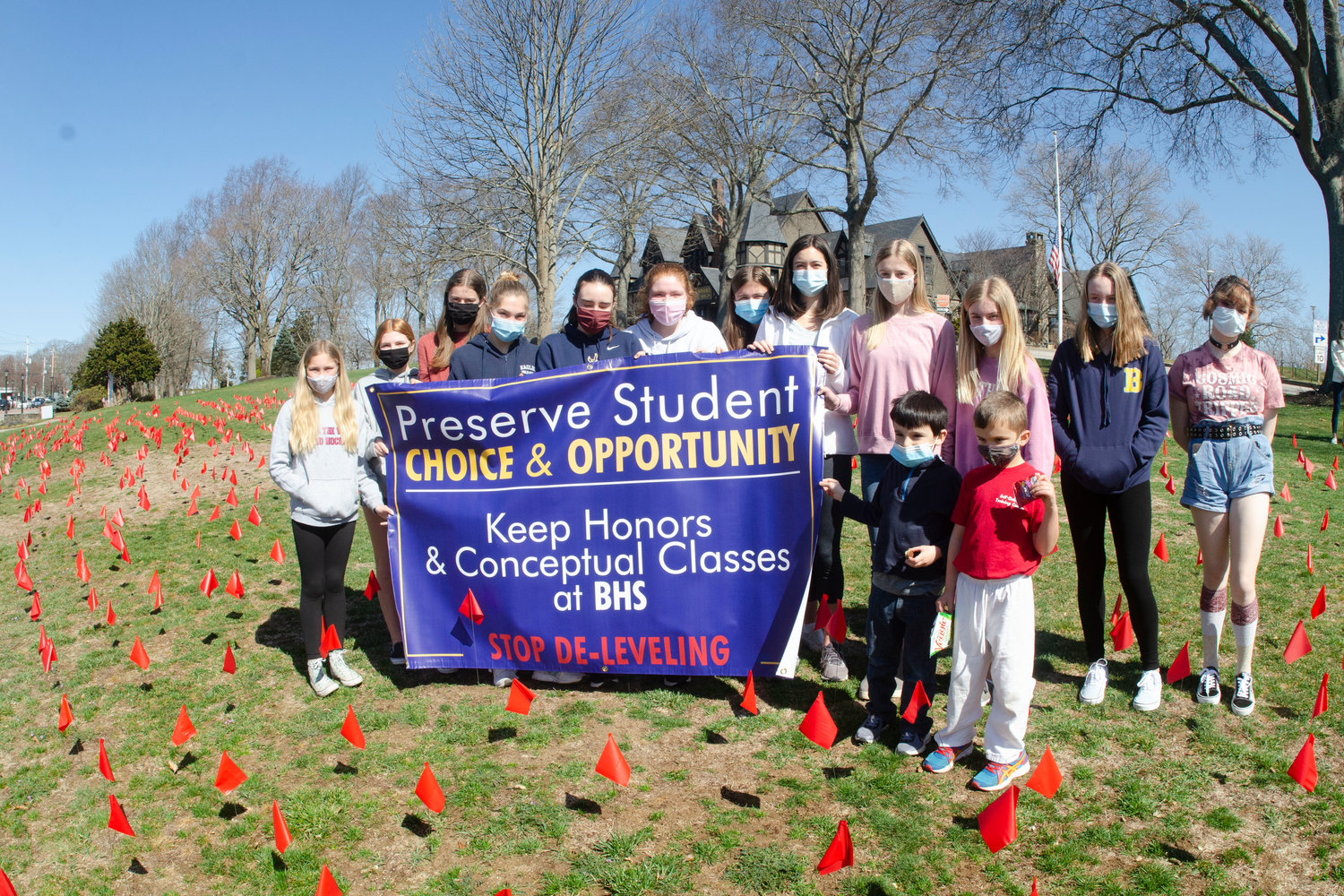Raising the red flag — parents, students react to course changes
Display of flags at town hall intended to send message to school administration
More than 1,300 people do not believe in the change.
In fact, 1,323 people, each one represented by a small red flag planted into the lawn in front of Barrington Town Hall, do not believe in the …
This item is available in full to subscribers.
Please log in to continue |
Register to post eventsIf you'd like to post an event to our calendar, you can create a free account by clicking here. Note that free accounts do not have access to our subscriber-only content. |
Day pass subscribers
Are you a day pass subscriber who needs to log in? Click here to continue.
Raising the red flag — parents, students react to course changes
Display of flags at town hall intended to send message to school administration
More than 1,300 people do not believe in the change.
In fact, 1,323 people, each one represented by a small red flag planted into the lawn in front of Barrington Town Hall, do not believe in the school department’s change to the BHS program of studies.
The group that organized the display hope that it will serve as a loud reminder that there are more than few people in Barrington who oppose the “de-leveling” of courses at Barrington High School, who oppose the elimination of Honors ELA classes and Level 3 conceptual classes, and who say they are troubled with the lack of transparency and communication exhibited by school officials with this change.
The flags, organizers said, send a message that a change like restructuring the program of studies, deserves “public dialogue, clear rationale, compelling data, and input from parents, students, teachers, and the community before being implemented.”
But that is not what happened, said Emily Ford, one of the residents who helped organize the display. The Fords were shocked and confused when they opened the BHS course catalogue a couple of months ago and discovered that 10th grade Honors ELA had been eliminated.
“What happened?” Ms. Ford said. “Where did this go?
“And then, when you started to ask more and talk to other parents like Ritzy (McCarthy), you realize, oh, they started taking away their conceptual Level 3 classes several years ago and have slowly been eliminating the student choice at the high school. Next year will be the first time they eliminate dedicated Honors courses. Our point is there’s been absolute lack of transparency, but also we want to preserve student choice and opportunity at the high school.”
Ritzy McCarthy said she has been aware of this change for years, and wants to see school officials reinstate the Levels at Barrington High School.
“Levels are not tracks. Tracks are antithetical to equity and inclusion, absolutely. But at Barrington High School we never had tracking. Levels allowed students choice,” Ms. McCarthy said. “A student who could excel in math, could take an Honors or Advanced Placement class. But maybe that same student was weak in Social Studies or ELA and they could take a slower paced Level 2 or formerly existing Level 3, now defunct Level 3 English or Social Studies classes.
“That is not an option for them anymore. This is a problem.”
Ms. McCarthy, who teaches at a university in Rhode Island, agrees with the district’s use of UDL — Universal Design for Learning — but cautions that it does not mean officials need to eliminate levels of courses.
“And if you don’t believe me, just look at Groton Dunstable,” she said.
Groton Dunstable High School in Groton, Mass. was home to Katie Novak, an education consultant who is an expert in UDL. Ms. Novak will speak during Barrington’s April 1 presentation about the change in the program of studies. Barrington officials have also invited the principal of Groton Dunstable to speak at the event.
“Groton Dunstable, the place where Ms. Novak is coming from, as well as the principal, they have three levels just like we used to have, and AP,” Ms. McCarthy said. “So why can they keep the levels they have there — look at their program of studies — and they keep those levels, but we’re de-leveling?
“We’re making three lanes merge into one. Why? It makes no sense. What’s happening is conflation of ideas. That’s what’s happening. Universal Design for Learning is absolutely best practices, inclusion, equity, absolutely. One hundred percent for that. However, that’s not mutually exclusive. Those ideas can be implemented in the different levels we have.”
A closer look at Groton Dunstable’s program of studies shows that it offers Honors courses and Open Honors courses, as well as conceptual courses. In fact the Massachusetts school has 47 Honors course offerings compared to five at Barrington High School.”
An email from a Barrington resident who has been following the situation closely states: “Their (Groton Dunstable’s) college readiness scores are about 10 percent below Barrington, making their ranking well over 800 to our 199. However, their Math and English proficiency scores are far superior to Barrington. We are excited to hear how they made this happen. However, they are also a district that offers significantly more class choices to their students. If we want to follow (Groton Dunstable), then we need to ADD more class choices, not take away.”
Students’ voices
On Saturday, dozens of people, including some Barrington High School and Barrington Middle School students, turned out to the town hall to show their opposition to the district’s change in the program of studies at Barrington High School.
Lily Cregan, a BHS freshman, said the change will present problems for many students.
“As I passed out flyers a couple weekends ago, I talked to some people, and yes, as an honors student I am not looking forward to this change. But what we’re not talking about is how it’s going to be even worse for conceptual learners,” Lily said. “How would you feel learning in a class where kids are so far surpassing you? You will just shut down. It’s not going to be motivating at all.”
Barrington High School freshman Kate Mellen agreed.
“Conceptual classes, if you’re going to take those away completely, when you put learners who work at a slower pace into a high level class, if they can’t keep up, they’re going to get pushed down into Lifeway Paths, where you don’t even get a high school degree, so that’s not helping anyone,” she said.
Megan McCrann, also a freshman at Barrington High School, said Honors courses offer students an opportunity to go deeper with their work and learning.
“In language arts, we had a book we had to read. So in the Honors class, our teacher put us into individual groups and we got to work with different students and we got to pick the level of book we wanted to read,” Megan said. “And I know that we did a lot more in-depth research with it. Where the regular class, they read it all as a class and they read the least challenging book and they all worked together. So it’s more independent, you get more out of it.”
BHS freshman Sophia Ford saw more opportunity for greater learning with the current levels and Honors course offerings.
“I think what’s so nice about having leveled classes is it allows everyone to pick and choose what they’re really good and what they’re really interested (in),” she said. “And by taking away the Honors class, you’re taking away the choice for people what they really want to focus on. Maybe they’re better at one subject than another, but by taking away the Honors classes you’re taking away the students’ choice for deciding what they want to be more focused on, what they want to challenge themselves in.”
The students who stopped by the town hall on Saturday also voiced concerns about what the change will mean for teachers at the high school.
“When you try to put so many people together that all need different levels, the teacher has to try to (cast) a broad net and help everyone,” said BHS freshman Chelsea Duncan. “But not everyone gets the depth of what they need. Maybe the students need to be pushed farther. Maybe they’re being pushed a little, but not as far as they could. The students who need extra help are getting some extra help. The teacher can’t do everything.”
Lily Cregan agreed.
“My advisory teacher taught a conceptual chemistry class a couple of years ago and she just explained to me how within that one class, she had three different levels of learners. She had learners that tried and weren’t getting the material. She had learners that did not care at all. And learners who had certain set-backs. And she said it was a challenge enough to just teach a conceptual class with three groups of students. And you’re going to get students that … you’re going to have two or three levels in each class, so how many groups of students can your teacher teach at once and actually be benefitting people?” Lily said.
Kate Mellen said she spoke to a teacher at the high school who was worried about the change.
“Last year he taught a lower level math class and he was saying it was so difficult to challenge the people that needed to be challenged, because he was spending so much time with the kids that needed to learn stuff that had already been taught but they hadn’t been paying attention,” she said.
Added BHS freshman Chloe Moscrop: “My teacher for one of my classes, we see her struggle every day because she’s trying to share a screen and start a lesson. She already has to stop that screen-share to let kids in who maybe they were a little late to class. She needs to take the time, and it’s hard over Zoom as well, but she needs to take the time to help those kids who need extra help while giving kids that need stuff to do … keep them busy.”
The students said that adding an Honors designation will not provide the same level of rigor that Honors courses offer.
“The supplement of the Honors designation in a class, is nowhere in comparison to a whole 10 months of teacher-on-student learning, and how you take tests in Honors level, you have homework of Honors level, and it really prepares you to take AP as well,” said Chloe. “I think if students aren’t getting that preparation they need, they might not want to take those AP classes, which doesn’t look as good for the school too. Kids might not do as well in those classes because they didn’t have the preparation they needed… It’s such a different experience. Personally, I’m taking Algebra II Honors because I doubled-up in math. I’m in a classroom with kids who are engaged, in break-out rooms we have good conversations. It’s just so different. I’m getting much more out of it than if I was just to do a side-project by myself.”
Chelsea added: “At the public forum someone asked, we’re all doing this, we all clearly don’t want this, no one spoke in support, what happens next. Now that we’ve done all this are you going to listen? And they said we’ve been working on this for years, everything is in place, it’s basically alluding to they’re not going to do anything because they’ve been planning it for so long, but they didn’t tell anyone. Nobody knew. There was no chance to stop it.”











